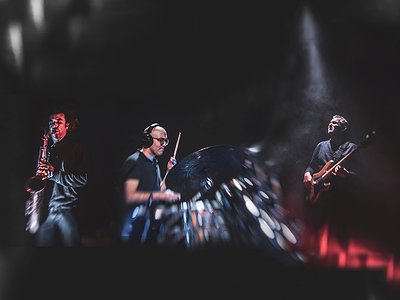Name: Ill Considered
Members: Idris Rahman (saxophone), Liran Donin (bass), Emre Ramazanoglu (drums)
Occupations: Instrumentalists, improvisers, performers
Current Release: Ill Considered's Liminal Space is out via New Soil.
If you enjoyed this interview with Ill Considered and would like to stay up to date on the band, visit their official homepage. They are aso on Facebook and bandcamp.
Where does the impulse to create something come from for you? What role do often-quoted sources of inspiration like dreams, other forms of art, personal relationships, politics etc play?
It’s just always there. There’s no overt awareness of influences in the moment, although environment and other immediate factors undoubtedly have an effect.
For you to get started, do there need to be concrete ideas – or what some have called a 'visualisation' of the finished work? What does the balance between planning and chance look like for you?
Absolutely not. There’s no planning at all.
We’re not relying on chance either though. It’s quite a different process than that. It’s a process based on trust and mutual experience.
Is there a preparation phase for your process? Do you require your tools to be laid out in a particular way, for example, do you need to do 'research' or create 'early versions'?
Not at all. We kind of bypass anything involving that mindset or superstition.
Do you have certain rituals to get you into the right mindset for creating? What role do certain foods or stimulants like coffee, lighting, scents, exercise or reading poetry play?
We don’t unfortunately. It sounds kind of fun, but we don’t have any rituals as part of our process.
What do you start with? How difficult is that first line of text, the first note?
Whatever comes out. It really is genuinely an organic process.
Once you've started, how does the work gradually emerge?
The music is just guided by our interplay. It really can go anywhere that we are able to take it.
It’s a natural conversation between us all. The beautiful thing was the same conversation happening when we invited guests to join us.
Many writers have claimed that as soon as they enter into the process, certain aspects of the narrative are out of their hands. Do you like to keep strict control over the process or is there a sense of following things where they lead you?
Again, neither is quite applicable to what we do. It’s a very controlled process in as much as we are aware, but guiding according to the nature of the conversation we are having.
It’s rather like speaking to each other in terms if how natural it feels.
Often, while writing, new ideas and alternative roads will open themselves up, pulling and pushing the creator in a different direction. Does this happen to you, too, and how do you deal with it? What do you do with these ideas?
Our writing really happens in the moment so it’s all about embracing the opportunities our improvisation presents.
We don’t feel pulled, but are happy to go with our instincts.
There are many descriptions of the creative state. How would you describe it for you personally? Is there an element of spirituality to what you do?
We never discuss it actually. It feels rather pure for us.
It’s not a separate state, it’s just we happen to be playing with each other rather than sitting or just talking. It’s as spiritual as any other part of our lives.
Especially in the digital age, the writing and production process tends towards the infinite. What marks the end of the process? How do you finish a work?
It’s just done when we’re finished. We’re all lucky enough to have quite some production experience, so don’t really approach the music with a literal mindset or particular fears or concerns over completion.
Once a piece is finished, how important is it for you to let it lie and evaluate it later on? How much improvement and refinement do you personally allow until you're satisfied with a piece? What does this process look like in practise?
That’s not really part of the process necessarily.
The last album was more involved so we had the luxury of listening back and tweaking the mix at one stage. But, we generally work quite quickly.
What's your take on the role and importance of production, including mixing and mastering for you personally? How involved do you get in this?
It’s vital. We do it all within the band from recording to mixing to mastering to atmos mixes.
After finishing a piece or album and releasing something into the world, there can be a sense of emptiness. Can you relate to this – and how do you return to the state of creativity after experiencing it?
It’s not something we’ve experienced before. We feel lucky to have avoided that state!!
Creativity can reach many different corners of our lives. Do you personally feel as though writing a piece of music is inherently different from something like making a great cup of coffee? What do you express through music that you couldn't or wouldn't in more 'mundane' tasks?
It’s different in that it fulfills a different function in sustaining us purely emotionally rather than stimulating or comforting us physiologically in companion with any emotional attachment one might have to mild narcotics!
We are all fans of coffee though.

